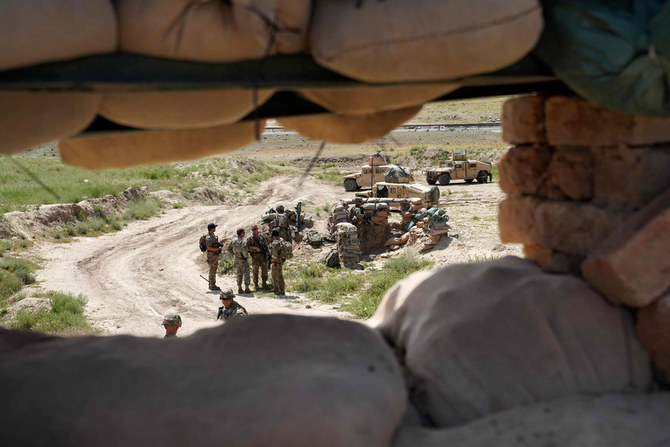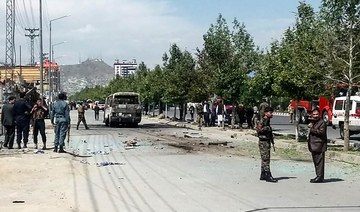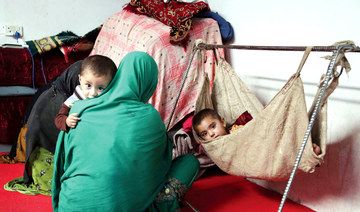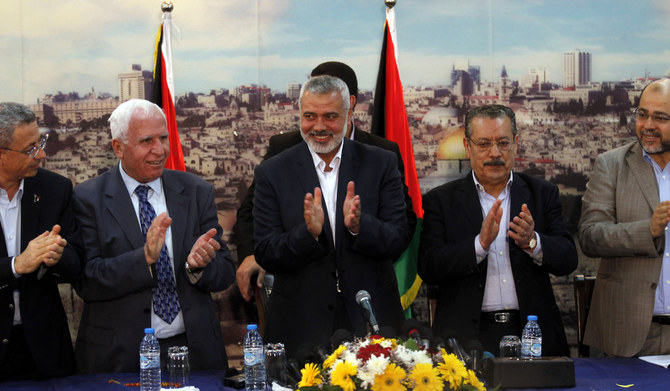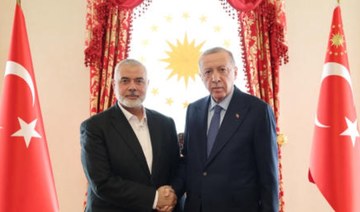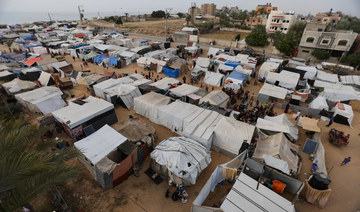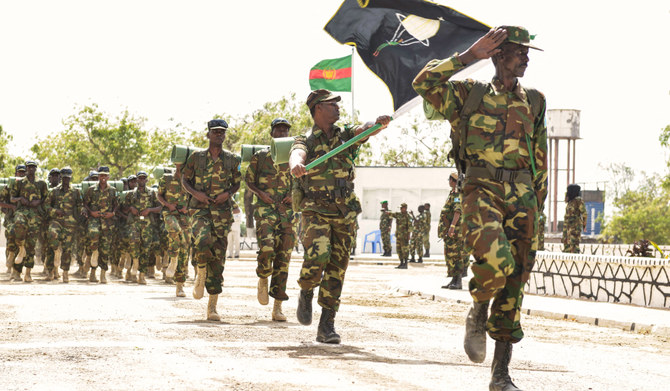WARDAK, Afghanistan: It began with a notice pasted on local mosques asking residents to “start digging underground safe rooms.”
“Stop working on farms. Do not walk in the lands. We are shooting mortars. Be aware and do not complain afterwards,” a soldier from the Afghan National Army (ANA) told residents at a local bazaar in Alsang, a village in the Sheikh-Abad area, after the latest round of clashes with the Taliban.
The Taliban followed suit with their own statement urging people “not to walk outside after 9 p.m.” “Anyone found walking, will be arrested and charged as a spy,” they warned.
The notifications were posted toward the end of March when the Afghan spring began.
Four months on, the fear tactics seem to have worked.
Today, the streets have a deserted look as the Taliban strengthen their presence in Wardak, the gateway to Kabul, and clashes with pro-government forces become more violent and brutal.
The estimated population of the province, which is an hour’s drive from Kabul, is 900,000, a majority of whom are Pashtuns, with a sizeable chunk from the Hazara and Tajik communities.
Locals here speak either Pastho and Dari, with some speaking both, and are united by their struggle to not be caught in the crossfire.
“In an hour, the Taliban shot two rockets while we were working on the farms. As a response, the ANA shot tens of mortars, all heading in different directions, hitting mainly farms and villages,” said Mujeebullah, a 21-year-old local farmer and resident of Sheikh-Abad area. The area lies along the highway leading to the Saidabad district of the province.
BACKGROUND
The streets have a deserted look as the Taliban strengthen their presence in Wardak, the gateway to Kabul, and clashes with pro-government forces become more violent and brutal.
Despite being a very conservative province, it is renowned for being home to one of the most educated tribes in the region, with several residents going on to acquire cadre positions in both military and civilian offices.
Wardak is also a key province due to its strategic location and proximity to Kabul, and also because it is located in the middle of highways that connects the west to the east, and the north to the south of Afghanistan.
It is a geographical nugget of information that is not lost on the Taliban or the ANA.
Livestock production is one of the key sources of livelihood in the region, although the decades-long Afghan war has taken a significant toll on the economy here.
Working on the farm nowadays is almost impossible. “In a hour, two rockets landed on the farms from the Taliban side, and a large number of the mortars from ANA arrived from the opposite direction,” Mujeebullah said.
“We cannot escape, otherwise we will run away as soon as possible from this land,” said Hamid Ahmadi, a resident of Alsang Valley, commenting on the lack of employment in the province.
More civilians were killed in the Afghan conflict last year than at any other time, according to a UN report released in February this year.
The report documented 3,804 civilian deaths in 2018. Among the dead were 927 children, the highest recorded number of boys and girls killed in the conflict during a single year.
The deaths and ongoing conflict continues to be a stark reality that several struggle to come to terms with.
“We do not know how and when the Taliban will plan a bomb, and what ANA soldiers will do as retaliation,” said Maleem Mahmod, from Chack district. ” Once — he adds — they (ANA soldiers) in the Alsang area of Chack District even targeted the solar panels, cutting the electricity of all the Alsang area in Chack District.”
“We are tired of the war. We are tired of both the government and the Taliban.”
Hamid Ahmadi, resident of Wardak, Afghanistan
“We are exhausted by this situation,” Maleem said.
The conflict has also to divided many families. In a traditional Afghan extended family, it is not unusual to have one member fighting with the Taliban while another is employed with the army.
Others who are not caught in the divide worry about losing their loved ones to the war. Esmat Amanzai, from the Jaghatu district, recently lost his younger brother in a drone strike. A few months later their mother — overcome by grief — died, too.
It is a narrative that a majority of the families are all too familiar with across Afghanistan.
The only difference is that in Wardak, which is the main hub for economic roots with Pakistan and Iran, clashes are taking a turn for the worse, turning the province into a battleground for the two groups.
Americans soldiers used to call the highway of Wardak the second Fallujah. In 2013, hundreds were killed, including a team of Navy Seals, in a Taliban attack in the Tangi valley in the Saidabat district along the Kabul-Kandahar highway.
Locals say the situation has not been this bad since 2001.
“Now we cannot come and go in the area as we wish, nor do our guests or relatives have the freedom to visit,” said Hamid Ahmadi.
Despite ongoing efforts for negotiations, the Taliban continue to make incremental gains on the ground.
According to a report by the Special Inspector General for Afghanistan Reconstruction (SIGAR), as of Jan. 31 last year, 229 districts were under the Afghan government’s control, which is about 56.3 percent of total Afghan districts.
This, as well as the clear intention of the US to leave the country as soon as possible, has given the Taliban a stronger hold against the current government.
In the eventuality of a negotiation settlement, it is unlikely that the insurgency group will accept any power-sharing offer. The Trump administration has announced its intention to leave Afghanistan as soon as possible, giving the Taliban strong leverage in the peace negotiations. And the Taliban are no longer internationally isolated. Both Russia and Iran have engaged in talks with them in the hope of countering the Daesh threat in the region.
“When the Taliban capture an area, people leave in mass exodus due to the violence of the conflict, joining the internal displacement camps located on the outskirts of Kabul. They know that by the next morning the ANA will shoot them with DC mortars. They would rather become refugees and leave everything behind than die,” Maleem Mahmod said.
For any ANA patrol hit by an EID or bomb, the retaliation is huge. ANA soldier or pro-governmental militia go around the villages hunting all male residents and accusing them of being Taliban supporters. “They hit them with wooden sticks, cables, guns and other things. They accuse us of knowing where the bomb was and not warning them,” Mahmod said.
Reports of Afghan National Police and pro-governmental militias abuses are not new.
In 2011, Human Right Watch issued an extensive report based on more than 120 interviews, carried out in the most remote areas of different provinces of Afghanistan. They documented the abuses carried out by pro- government forces and militias against the local population.
In 2016, the Ministry of Interior committed to enforce a series of guidelines on operational rules, aiming to ensure that local police recruits would be individually vetted, and the allegations of abuses by pro-governmental forces seriously investigated. So far however, the Afghan government has failed to hold their personnel accountable for the systematic torture, extrajudicial executions and enforced disappearance made in the name of the fight against terrorism.
The 2001 the US-led invasion of Afghanistan was itself a counterterrorism mission against Al-Qaeda and what it assumed were their allies, the Taliban.
In 2015, Daesh announced its expansion into Khorasan Province, which historically refer to parts of Iran, Central Asia, Afghanistan, and Pakistan. Since then the US-led international coalition has been focusing its operations against the new Daesh branch in the region (ISKP Islamic State of Khorasan Province).
This means more enforced disappearances, mass arbitrary detention and extrajudicial killings. These are denounced regularly by the local population but are rarely investigated due to difficulty in gaining access to the region, and a lack of transparency or accountability on the part of officials.
Lately, however, new levels of brutality seem to have been reached.
According to the latest UN report published in April, in the first three months of 2019 Afghan and international forces were responsible for more civilian deaths than those killed by the Taliban and other militants.
According to the report, between January and March the insurgents killed 227 civilians and injured 736, while Afghan and International forces caused 305 deaths and 303 injuries.
Locals also suffer from harsh Taliban policies and militant measures.
Last summer, the Taliban from the Salar, Shash-Gaw and Sayed-Abad districts of the Wardak province forced locals to park their vehicles on the highway connecting South Kabul. After seizing the nearby province of Ghazni, the insurgents needed to block the roads to prevent ground military support in Kabul from reaching the areas. People were forced to remain at home, unable to go to work or go about their lives.
With the end of Ramadan, many had hoped for a cease-fire as a temporary break from the bloodshed. However, unlike in the past year, no agreement has been reached to stop the fighting during the three days of Eid holiday.
The 2018, the historic cease-fire was largely strategic rather than humanitarian. President Ghani’s offer to the Taliban was motivated by the will to officially take the lead and engage in the peace process. The Taliban accepted the invitation mainly to prove their cohesion and ability to control ground troops, despite rumors that they were incapable of doing so.
This year though, the game changed. The Afghan government has been completely alienated from the peace negotiations, directly led by the Taliban and the US. On May 30, Taliban members and some Afghan politicians manage to meet in the Russia capital, and issued a join-statement quoting “tremendous progress” in the peace negotiations. However, the reality is that both sides are engaged in a harsh fight and keep trying to maximize their leverage in the peace deal.
Next October it will be 18 years since the US-led invasion. The US has spend about $877 billion on the war. While the conflict continues to harm civilians and displace families, unemployment has reached a dangerous level.
“We are tired of the war. We are tired of both the government and the Taliban,” Hamid Ahmadi said.




